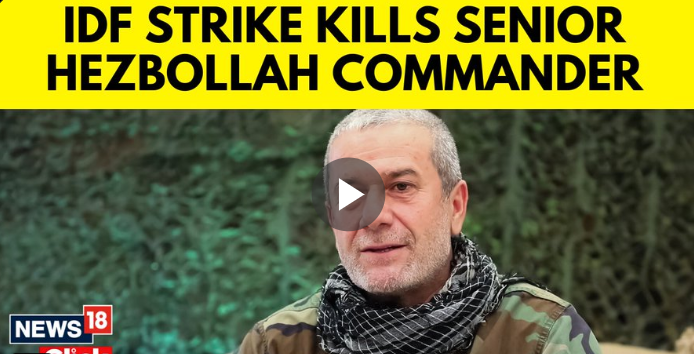Death and destruction is on the table in the Middle East. Such a sharp contrast to how well peace was working under President Trump.
Hezbollah has reported the death of one of its senior commanders, Mohammed Nimah Nasser, in an Israeli airstrike in southern Lebanon. In retaliation, the Iran-backed militant group launched a significant rocket attack against Israel. This latest incident marks a continuation of nearly nine months of escalating cross-border violence, raising concerns about the potential for a full-scale war.
Israeli strike kills top Hezbollah commander #Israel #Hezbollah pic.twitter.com/58VAxgFhsd
— News18 (@CNNnews18) July 4, 2024
Nasser, a commander of Hezbollah’s Aziz Unit responsible for rocket launches from southwestern Lebanon, is the most recent high-ranking Hezbollah figure targeted by Israel. Following his assassination, Hezbollah fired approximately 100 rockets and missiles at Israeli military positions. The Israeli military reported that some projectiles landed in open areas, causing fires but no injuries.
Israel accused Nasser of orchestrating numerous terror attacks and likened him to Taleb Sami Abdullah, another commander whose death last month led Hezbollah to unleash over 200 rockets into northern Israel in a single day.
Amid these hostilities, there have been vigorous diplomatic efforts to de-escalate the situation. The United Nations and the United States have issued warnings about the devastating consequences of a war that could potentially involve Iran and other allied groups. Since the onset of the Israel-Hamas conflict in Gaza on October 7, there have been nearly daily exchanges of fire across the Israel-Lebanon border.
Major Israeli airstrike in Tyre #Lebanon kills senior Hezbollah commander Abu Ali Nasr, head of Aziz unit…Situation already on edge: pic.twitter.com/SyZnWLENmS
— Joyce Karam (@Joyce_Karam) July 3, 2024
Hezbollah asserts that its actions support the Palestinian group Hamas, which also receives backing from Iran. Both Hezbollah and Hamas are designated as terrorist organizations by Israel, the United Kingdom, and several other countries. In recent weeks, Israeli officials have repeatedly emphasized their readiness to use military force to secure the northern border if diplomatic solutions fail.
On Wednesday, Israel’s Defense Minister Yoav Gallant stated, “We are striking Hezbollah very hard every day and we will also reach a state of full readiness to take any action required in Lebanon, or to reach an arrangement from a position of strength. We prefer an arrangement, but if reality forces us we will know how to fight.”
Despite its formidable military capabilities and reputation as a more potent adversary than Hamas, Hezbollah has expressed a preference to avoid a full-scale war with Israel. The group has indicated its willingness to observe any ceasefire in Gaza. Hezbollah’s deputy leader, Naim Qassem, emphasized in a recent interview that Israel should not expect Hezbollah to adhere to any predefined rules of engagement set by Israel.
Israel kills Muhammad Nimah Nasser, a major Hezbollah field commander, prompting the terrorist group to fire more than 100 rockets at northern Israel@zachonearth has the story: pic.twitter.com/4SAgZAEzcd
— i24NEWS English (@i24NEWS_EN) July 3, 2024
The ongoing conflict has resulted in significant casualties and displacement. Over 400 individuals, predominantly Hezbollah fighters, have been reported killed in Lebanon, while 25 people, mostly soldiers, have died in Israel. Additionally, tens of thousands of residents from both sides of the border have been forced to flee their homes.
The situation remains highly volatile, with both sides maintaining a posture of readiness for further escalation or potential diplomatic resolutions. If Biden and the Democrats have their way, this war will continue for many years, and eventually will involve even a NATO member: Turkey.
Major Points:
- A senior Hezbollah commander, Mohammed Nimah Nasser, was killed in an Israeli airstrike in southern Lebanon.
- In retaliation, Hezbollah launched around 100 rockets and missiles at Israeli military positions, causing fires but no reported injuries.
- The conflict has been ongoing for nearly nine months, with frequent exchanges of fire across the Israel-Lebanon border since October 7.
- Diplomatic efforts by the UN and US are underway to de-escalate tensions, warning of potential wider regional conflict involving Iran and other allies.
- The violence has resulted in over 400 deaths in Lebanon, mostly Hezbollah fighters, and 25 deaths in Israel, primarily soldiers, with tens of thousands displaced on both sides.
TL Holcomb – Reprinted with permission of Whatfinger News



